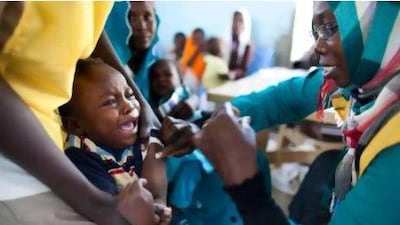ABU DHABI // The UAE is to spend Dh10 million building permanent homes in Darfur for 60,000 people displaced by last decade's civil war.
From 2003 until 2010, Darfur's rebel Justice and Equality Movement battled the Sudanese government, which it accused of oppressing non-Arab Sudanese.
Thousands died, more than two million were displaced and 150,000 others left as refugees.
"Darfur saw some very difficult times," said Othman Jafar, the Sudanese Red Crescent's secretary general said yesterday.
Now the fighting has ended, there is a need to get people out of tents and into homes. But many of those homes were destroyed so new compounds, such as the two the UAE is funding, are needed.
Announcing the agreement between the two countries' Red Crescents, Dr Mohamed Al Falahi, the general secretary of the UAE Red Crescent, said the money would be used to build two compounds in north and south Darfur.
Each will accommodate 30,000 people, with a school, a clinic, a well, a water tank, and a mosque. "We will work on infrastructure to encourage those displaced to go home," Dr Al Falahi said.
Mr Jafar said the compounds could be expanded in the future to house more people. "The UAE has helped a lot in Sudan, through the Red Crescent and other means," he said. "Dh10m … is a huge amount."
Since 1995, the UAE has sent 31 planes carrying food and clothes to the region, and Dh126m in aid. This year alone, it has given the country more than Dh18m in aid, up from Dh11m last year.
"This is very little compared with what they have really given to us," said Mr Jafar. "They have helped in development and agriculture projects in the country. Also during the times of flooding, the UAE was always one of the first to respond."
Sheikha Shamsa bint Hamdan, the wife of Sheikh Hamdan bin Zayed, the Deputy Prime Minister, has funded an orphanage in the region, which is now home to more than 4,000 children.
Work on the new homes will begin immediately, and the project should take no more than a year to complete. "There are still security problems, but these areas are safe," Mr Jafar said.
Dr Al Falahi said the UAE would continue to send volunteers regularly, the most recent delegation having gone just a month ago. For now, he said, infrastructure was the most important thing for the country.
Mr Jafar said the UAE and some other Arab nations were the only ones to keep this in mind. Other humanitarian organisation were focused only on improving conditions in refugee camps.
"The UAE and some Arab countries found the solution not in tents, but to build places for people to go back to," he said. "This will help to create stability."

